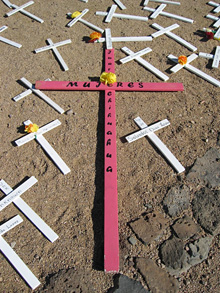On the Edge: The Femicide in Ciudad Juárez
 Toddy Burton - Newswire Toddy Burton - Newswire


| Illegal Art
Individual copies are available at http:www.illegalart.net for $13. If you would like to purchase multiple copies to help support this project and spread the word, please contact info @ illegalart.net.
(58 minutes NTSC DVD, 2006, in Spanish and English with English and Spanish subtitles) |
Just across the border from El Paso, Juárez holds countless secrets. A major center of drug trafficking and the scene of hundreds of unsolved femicides in the past 13 years, the industrial hub of northern Mexico is a nest of corruption.

Producer/director Steev Hise takes an international perspective on this localized tragedy with his low-budget documentary. Through a rough-and-tumble filmmaking technique, Hise overmanipulates his footage, using color saturations and unrelated archival material to punctuate some of his points.

But despite having a filmmaker at the helm who was a little too trigger-happy with his aftereffects, the movie tells a heart-wrenching story that remains ignored in any significant international capacity. Since 1993, more than 400 women have been murdered. The victims are predominantly young women (ages 15 to 25), students, and employees at maquiladoras (assembly plants that manufacture finished goods for export to the United States, i.e., cheap, outsourced labor).

In most cases, there were signs of sexual violence, abuse, torture, and in some instances, mutilation. Wading through the social, political, and economic effects of these crimes, Hise asserts his position: Using the femicides as the lens, the film contemplates international issues of malfeasance, free trade, drug trafficking, and poverty.

Clearly operating with limited resources from a grassroots perspective, Hise interviews mothers, activists, scholars, and writers to paint the portrait of a city in a state of severe crisis. Footage of and interviews with mourning mothers thrust into the role of activists is both agonizing and compelling. However, Hise's breadth is so far-reaching that it's difficult to maintain a through line.

I started to tune out when the film began to make its case for the legalization of marijuana. But multiple agendas aside, the subject matter is devastatingly honest. Indeed, the film attempts to make everyone more aware of a harsh reality, and for that we should all take notice. |



